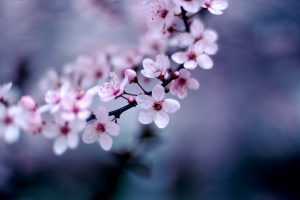“There’s something of real value to just slowing down, allowing ourselves to be part of nature, and experiencing that joy of the bigger world.”
“To grow and preserve food is to remember that life continues.”
In these difficult times, nature can be a balm.
On Start the Week this morning on Radio 4, Andrew Marr talked to the psychiatrist and keen gardener Sue Stuart-Smith on our love for nature. In The Well-Gardened Mind: Rediscovering Nature in the Modern World, “she blends neuroscience, psychoanalysis and real-life stories. She reveals the remarkable effects that gardens and the great outdoors can have on us.”
The programme also considered reading about nature as a therapy: “in a new biography, Radical Wordsworth: The Poet Who Changed the World, Sir Jonathan Bate shows how Wordsworth also made nature something challenging and even terrifying. The poet drew on shocking revolutionary ideas from the continent, including pantheistic atheism: the worship of nature.”
.
And now, more than ever it seems, the media has been tuning into the positive effects of nature:
.
The Tonic of Gardening in Quarantine
What all gardeners know, and the rest of you may discover, is that if you have even the smallest space, a pot on a window ledge, a front step, a wee yard, there is no balm to the soul greater than planting seeds. Watching them begin to sprout, checking far too often as the firm yet fragile stems break free of the soil, the dry seed-case caps, is a joy so strong you can feel it in your knuckles. Rose-geranium leaves and thyme flowers, the hit of petrichor from damp soil, are the scents of heaven.
Even B.C., this potential to grow things and feed people was a thrill. Now it makes me tearful with something new: gratitude. Suddenly, my least-gardeny friends are panic-buying radish seeds, punching holes in the bottoms of plastic boxes to start their seedlings. I delight in the new additions to my team, like a cheery pusher. Before, I was dehydrating, canning, making bread, yogurt, kimchi, and, oh, how they laughed. Now, suddenly, such things are almost a necessary act for maintaining sanity. To grow and preserve food is to remember that life continues.
The Tonic of Gardening in Quarantine | newyorker.com
.
Nature is a balm. Even when you can’t leave home.
What is it that makes nature a refuge for mental poise? “Nature is our ally. We’re part of it,” one scientist explains. “There’s something of real value to just slowing down, allowing ourselves to be part of nature, and experiencing that joy of the bigger world.”
Some people look for laughter in times of stress. Others seek distraction. But in this time of self-isolation, many are finding respite in nature.
 Beyond the promise of fresh air and a change of scenery, spending time with nature invites a sense of calm. The rhythms of the natural world serve as reminders that life goes on, even as we humans are consumed by uncertainty, says Patricia Hasbach, a clinical psychotherapist. It is a reminder that the world is greater than us and our stress.
Beyond the promise of fresh air and a change of scenery, spending time with nature invites a sense of calm. The rhythms of the natural world serve as reminders that life goes on, even as we humans are consumed by uncertainty, says Patricia Hasbach, a clinical psychotherapist. It is a reminder that the world is greater than us and our stress.
“Nature is our ally. We’re part of it,” says Dr. Hasbach, who co-directs the ecopsychology program at Lewis & Clark College in Portland, Oregon. “There’s something of real value to just slowing down, allowing ourselves to be part of nature, and experiencing that joy of the bigger world.”
Even as government officials have enacted stay-at-home orders, they’ve largely left room for walks and outdoor exercise. And folks have taken advantage of that option. However, in some cases, so many people have been flocking to parks, beaches, and hiking trails that governments have had to close public outdoor spaces because they were getting overrun.
Fortunately you don’t have to climb a mountain or swim in the ocean to reap the calming benefits of nature, researchers say. There are possibilities closer to – or even at – home.
Immersing oneself in a natural landscape yields the most restorative effects, says Dr. Hasbach, but there are several ways to connect to nature and all can be beneficial.
Less direct experiences, like looking out the window at a squirrel in a tree or tending houseplants, may not be as immersive as going for a walk in the woods, but researchers have found these activities can still offer benefits. Even vicarious experiences, such as watching a video panning over sprawling mountains or plains, or listening to recorded sounds of waves crashing on the beach, have been found to alleviate stress.
Dr. Hasbach and colleagues tested out this idea on one of the most nature-deprived groups of people: prison inmates in solitary confinement…
Nature is a balm. Even when you can’t leave home. | csmonitor.com